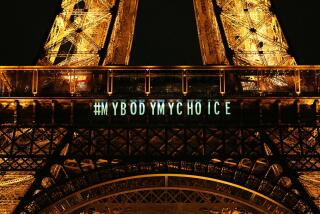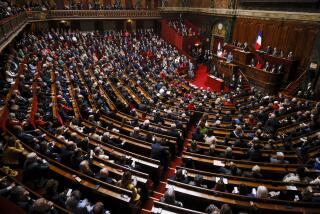France’s misguided plan to ban burkas
- Share via
France is a militantly secular state that is determined to remain culturally homogeneous. While holding dear the ideals of equality and human rights, the country also widely embraces assimilation -- the belief that to be French, immigrants and nationals alike must adhere to the language, customs, values and all-around French way of life. That is why France banned religious head scarves in public schools in 2004, and why lawmakers now want to prohibit women from wearing burkas or full-face veils in public places such as city halls and post offices, and possibly even parks and subways.
Although we understand that France wants to protect its secular national identity, such a ban would undermine fundamental religious liberty as protected under its constitution. Moreover, we believe that the latest effort to restrict the dress of Muslim women is unlikely to achieve its goal, and could have the opposite effect instead.
After six months of deliberations, a 32-member parliamentary commission last week urged the National Assembly to pass a resolution condemning the full veil and draft a law banning it. “The wearing of the full veil is a challenge to our republic. This is unacceptable,” the commission said. It suggested that veiled Muslims be denied access to public services such as buses. French President Nicolas Sarkozy and Prime Minister Francois Fillon favor a ban, which is expected to become law this year. That would be a shame.
Other justifications for the ban -- to protect women from oppression, to push back against religious extremism or to facilitate identification for security -- don’t convince us that it is necessary. Like Switzerland’s vote in November to outlaw construction of minarets, a ban on veils would provide further evidence of religious discrimination to those who believe the West is an enemy of Islam. In fact, French Foreign Minister Bernard Kouchner called the Swiss vote a show of “intolerance.”
The way to counter religious extremism and oppression is not to respond with additional repression but to encourage moderation and tolerance. The French Catholic Church rightly condemned the proposed ban this week, warning that it would be perceived as a direct attack on French Muslims and would make it more difficult to demand that Islamic countries respect the rights of their religious minorities. About 6% of France’s nearly 64 million people are Muslim, and only a few thousand women are believed to wear a burka or full veil. Although we agree that a full-face cover is degrading to women -- particularly when it is not worn voluntarily -- it isn’t a violation of the rights of others or a threat to the secular state. We believe in gender equality and protection of women’s rights. But we fear that the surest way to increase the number of women wearing a full veil is to tell them they cannot.
More to Read
Sign up for Essential California
The most important California stories and recommendations in your inbox every morning.
You may occasionally receive promotional content from the Los Angeles Times.










